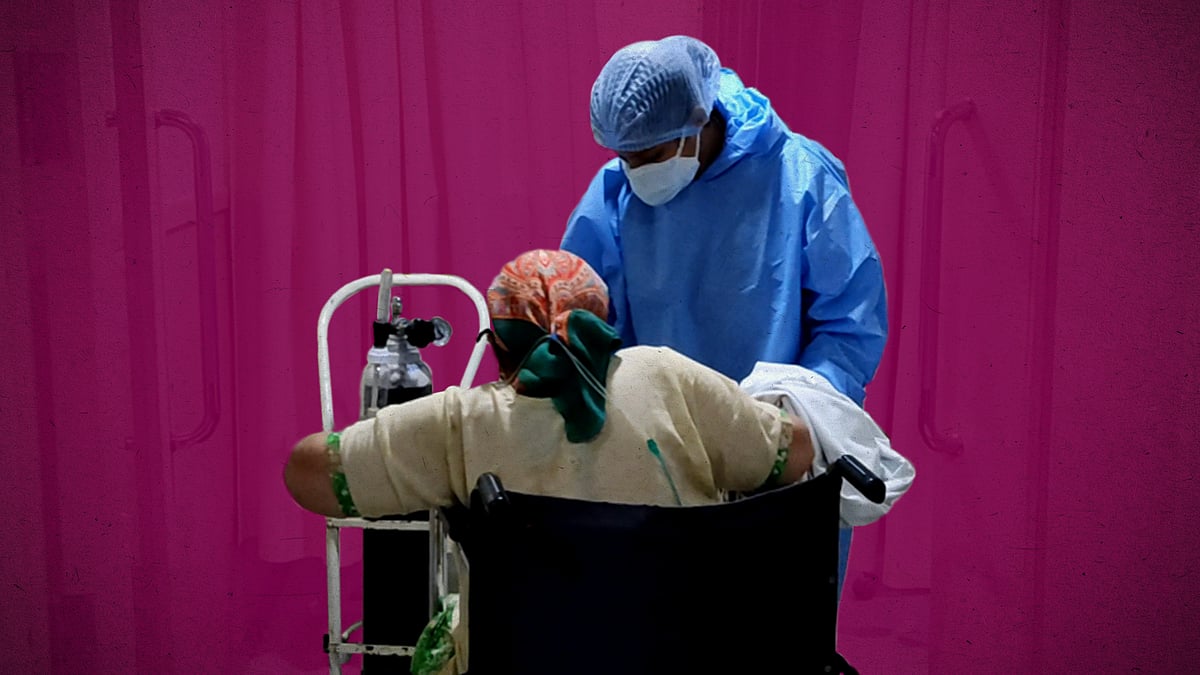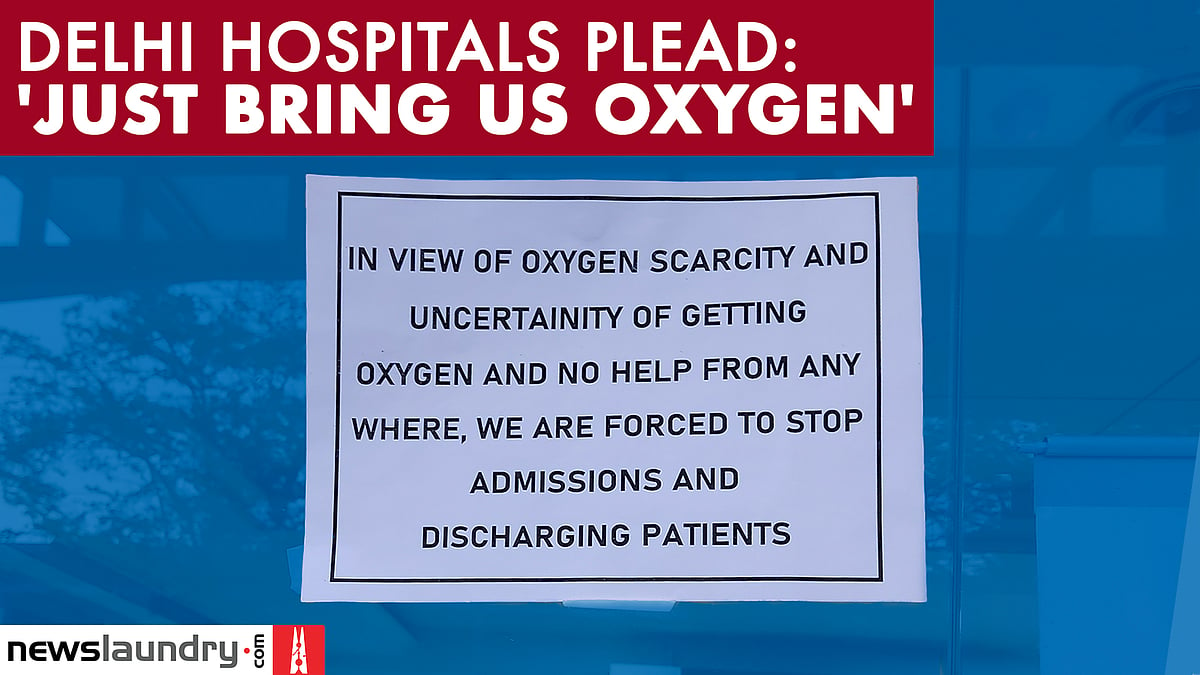‘We lost so horribly’: Batra Hospital sees eight patients die as oxygen runs out
It was one of several hospitals in the capital that put out SOS calls for medical oxygen through the day.
“Everyday we’re fighting a battle, some days we win, some days we lose. Today we lost so horribly,” said Dr SCL Gupta, medical director of Batra Hospital, Delhi.
The hospital ran out of oxygen Saturday afternoon, leading to the death of eight patients, including one of its leading doctors.
At around 12.15 pm, Dr Sudhanshu Bankata, executive director of the hospital, had put out an SOS: “We have just run out of oxygen.” He added that the hospital was “surviving” on a few oxygen cylinders but those would run out in another 10 minutes as well. “We are again in a crisis mode. The Delhi government is trying to help us out but I believe the tanker is quite far away from our hospital. So let’s hope that something comes out of this,” he said.
An oxygen tanker did reach the hospital at around 1.35 pm, but by then eight patients lay dead. One of them was Dr RK Himthani, 62, head of the hospital’s gastroenterology department. “He worked so selflessly and saved so many lives in this very hospital,” said Gupta, referring to Himthani. “The oxygen was one and a half hours late. We lost eight innocent patients today and there was absolutely nothing we could do about it.”
By 3.15 pm, Gupta told Newslaundry, the hospital was again in crisis mode. “Now we again have only two hours of oxygen left,” he said.
There are 326 patients in the hospital, 300 of them admitted with Covid. At least 230 of the patients are on oxygen support, and 33 Covid patients are in the Intensive Care Unit.
Continuing crisis
Around the same time that Batra Hospital’s doctors were appealing for help to save their patients, Sehgal Neo Hospital in Paschim Vihar was tweeting out an SOS: it had been waiting for oxygen since early morning and was now running out of backup supply. At that point the hospital had 90 patients on oxygen support and 13 in the ICU.
In another SOS at 2.54 pm, the hospital asked for help to urgently procure oxygen cylinders as its backup supply was running out. At 3.21 pm, the hospital’s associate director, Rachna Sehgal, informed Newslaundry they had backup supply for only “half an hour or even less”.
The hospital had flagged dangerously low oxygen levels on April 29 as well, saying it had just about an hour’s supply left for 70 patients on oxygen support. The oxygen crisis had been going on for 10 days, the hospital added.
“It is probably going to give us a heart attack. It seems so unfair that we are doing whatever we can for these patients, accommodating as many as we can but because of factors not in our control, we are not able to save their lives,” she said, breaking down over the phone.
Rachna explained that the hospital has been grappling with erratic oxygen supply for days now. To compound the problem, the Delhi government suddenly changed its oxygen supplier on April 29.
The new vendor, she said, is a “small-time” supplier and only has small oxygen cylinders of 40-60 litre capacity. Normally, Rachna added, the hospital needs eight tanks of liquid medical oxygen a day which the new vendor is unable to supply.
The hospital was trying to be reassigned to the old vendor, only to be told on Friday night that they would have another new supplier.
“Once that happened we realised we still needed liquid medical oxygen, and it would take ages to get in touch with this supplier because nobody there was picking up the phone or responding to mails,” she said. “We’ve just been chasing everyone since morning and explaining to them that until we enter into an agreement with this new vendor, please arrange to give us some oxygen.”
It’s a similar story at Moolchand Hospital in Lajpat Nagar. “Like every hospital in this city, we are fighting and surviving by hours, minutes and seconds every single day,” Dr Sachin Ambekar, general surgeon, said.
The hospital has never run out of oxygen completely, he added, but “escaped by the breadth of a hair” on two occasions in the past few weeks.
The hospital currently has 154 patients in house, most of them with Covid, and 68 more in a hotel outside. Ambekar said all Covid patients except one or two in the hotel are on oxygen support, while 14 are on ventilator support.
They are not in immediate danger of losing any patient for want of oxygen, Ambekar said, but “it’s difficult to explain what a crisis this is. If oxygen reduces to a certain point, the pressure in the walls of the pipeline will go down. This means there will be a sudden depletion of oxygen pressure in the ward and the patients will start getting desaturated. So even if there is oxygen, we have to make sure the pressure doesn’t reduce. Hence, it’s not one or two crisis situations, it is a continuous crisis situation.”
Across Delhi’s border in Gurgaon, Care Newborn and Child Hospital, a non-covid facility, tweeted out a distress call at 11.35, claiming its supplier had refused to provide further oxygen. The hospital had six babies in their Newborn Intensive Care Unit at the time and needed at least six cylinders of oxygen per day. “Kindly help us in procuring them for the sake of the babies and mankind”, their note read.
Speaking with Newslaundry later, Sourojit Gupta, the hospital’s head of neonatology, said, “I had supply left for 10-12 hours and sent three cylinders to be refilled from a centre in Manesar this morning, but we did not get any response there.”
In the afternoon, however, Gupta said, they were assured by local authorities, including the police, that they would get oxygen on a daily basis from now.
Was their vendor unable to supply the hospital because of the ongoing oxygen crisis caused by the Covid surge? “Maybe,” he replied. “Everyone is in need of oxygen, maybe the supplier had run out of oxygen or had to supply it to a Covid patient who he thought really needed it.”
Today wasn’t the first time that lives were lost due to the shortage of oxygen in the capital. On April 23, the Jaipur Golden Hospital, in Rohini, lost 25 patients due to oxygen shortage. “We are literally gasping for breath," Jaipur Golden Hospital said in a plea to Delhi High Court the next day.
The same day, Sir Ganga Ram Hospital, one of the capital’s largest medical facilities, lost 25 patients in 24 hours for want of oxygen.
‘Situation has improved’
On April 25, union home secretary Ajay Bhalla wrote to Delhi’s chief secretary that the state government could have “avoided tragic incidents” if it had ensured timely transportation of oxygen. Two days later, Arvind Kejriwal, chief minister of Delhi, said in a press conference that the oxygen situation had improved.
The Delhi High Court, however, wasn’t convinced that the situation had improved and on April 29 came down heavily on the central government, asking, “People will keep dying and you will not do anything?” The court pointed out that the government had failed to supply the allocated 490 metric tonnes of oxygen to hospitals in the city.
At a hearing today, the high court, taking cognisance of the lives lost at Batra Hospital, told the Narendra Modi government, “Water has gone above the head. You have made the allocations. You have to fulfill it. Eight lives have been lost. We cannot shut our eyes to it.”
The court again directed the government to make sure Delhi got its allocated 490 metric tonnes of oxygen a day. “The allocation was made on April 20 and not even for one day Delhi has received its allocated supply. If this isn’t implemented, we may even consider initiating contempt proceedings," the court said.
 Watch: Why doesn't Delhi have enough oxygen?
Watch: Why doesn't Delhi have enough oxygen? 'Just bring us oxygen': North Delhi hospitals plead for help
'Just bring us oxygen': North Delhi hospitals plead for help